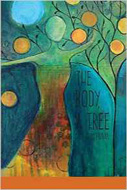 Amy MacLennan
Amy MacLennan
The Body, A Tree
MoonPath Press
ISBN: 978-1-936657-22-3
Reviewer: Cindy Hochman
For any reader who is at all spiritually inclined, the title The Body, A Tree, along with the ethereal artwork on the lovely cover, immediately summons the figure of the Bodhi tree, under which the Buddha found enlightenment. The sturdy branches of Amy MacLennan’s body tree envelop revolving seasons of deep sensuality, through hedonic and voluptuous fruits and edibles, through love’s bitter loss, to a path of exhilarating rediscovery of passion and mindfulness.
Four more cloves crushed into hummus,
spread on toast, a mashing
so thick with garlic it almost pollutes us,
hangs on our air, our tongues pickled
though I kiss you and can’t sense it in your mouth,
just my own, and the sting stays
until we sleep and my sweat runs with it then,
spilling into the quilt, spicing the feathers…
…
…orange birds
fly from between my legs and I smell
mango, coconut…
(“Garlic”)
It is not coincidental that the term pièce de résistance can refer to either a masterpiece of a feast or a creative work, and MacLennan offers a savory display of tantric dishes relevant to both. This convergence of food and arousal not only makes for robust and succulent poetry but also draws an important distinction between need and want. Certainly, “green olives with Medjool dates,” as a phrase, is meant to be exotic (and erotic), but the sustenance found in these poems is not only pungent, but poignant: food provides psychological solace during the rough patches, a panacea when a lover leaves, and the poet’s recall of the sweet bon-bons her mother delighted in just prior to her death (“Her favorite was the raspberry creams. Dark chocolate and smooth pink center”). MacLennan’s menu includes a wide variety of victuals that not only cater to the spice of life, but the life cycle as well.
The colors are endless. Small papers
with green done forty-five ways.
I need to change my ex-lover’s
office, cover his nail holes,
paint over the breath-steeped walls…
…
…My colors
have gone sour, past-laden,
memory-smacked.
…
…I’ll paint that room
a soft gray, will wait for my colors
to come back.
(“Painting the Room I Now Use for Guests”)
Rock singer Tom Petty observed that “the waiting is the hardest part,” but for this poet, the waiting is simply another kind of knowing. The title “Early Frost This Year” can surely be interpreted as a metaphor for the poet’s emotional chill:
This is the fading time
the smothering time—
return of sallow faces,
heavy clothes all grays and blacks,
start of moods to eclipse.
This is the morning to take
a violent breath,
a gather of anything green,
or wilt-free left.
A token for the waiting…
But while there is acknowledgment of a grieving within the act of painting her ex-lover’s room a dull and cheerless color, there is also forbearance and equanimity in her firm resolve to “wait for my colors to come back,” her words and heart holding a devout optimism that they will. MacLennan seems to relish, however wistfully, this peaceful interval of biding her time, taking a breather from lustful exploration of the body as she ponders nature and freedom, and, of course, partaking in some culinary comfort. Within these poems, MacLennan has steeled herself well for “the body yoked by starve and crave… / even as there’s a begging for the spill of cherries across the fingers, / the mouth.” But it is also clear that she has vowed not to forget the sweet taste of desire, as evidenced by the inference of carnality in the phrase “a throb of crickets” in “Awake, Midnight,” a four-line poem whose brevity bespeaks only a temporary state of deprivation.
Imagine our bodies, the shine
of ten-year-old scars,
knobs of re-set bones.
Think of the way we fill
our crumbling teeth
and hold our own gold.
We piece our fragments together
a new way each time,
we repair what we can.
Our vessels holding blood
and bone make a changed shape,
and we long to be more gorgeous
with the breakage.
(“Kintsukuroi”)
Having weathered the seasons, the poet accepts the scars, shards, and the shattering. Her allusion to a “gorgeous breakage” celebrates, rather than mourns, the passage of time, leaving her none the worse for the wisdom. Despite a recognition of the body’s limitations, in the final act, love and lust make a comeback as the poet had forecasted: youthful, ripe, and just in time for the dog days of summer:
with sinews all syrup
and sweat-licked…
…
…The body
in summer, now a boat,
small sway in water,
a float of belly and back
as it craves melon, tomato,
corn warm from the field…
(“The Body, in Summer”)
The Kama Sutra acrobatics aside, in “I Close My Eyes When I Listen to Poetry,” MacLennan brings her brand of sensual energy to the intimate folds of poetry itself, seductively beckoning her fellow poets: “I want to be / your mouth, in the dark, your tongue / between our lips, the liquid l’s and r’s, / a fricative f in that inverted kiss.”
The Body, A Tree
might think itself lemon,
overgrown behind a steel-grey house,
and pulls in fat bees,
holds to bright and sour…
…
…The body wishes.
For soil, for fruit.
For light to grow through,
wood hardening
to an ache.
A lemon, of course, can refer to a car that is rattling its way to the junkyard. But in MacLennan’s title poem, lemons more precisely bring to mind the affirmative aphorism that when life hands you lemons, you should go ahead and make lemonade. In The Body, A Tree, Amy MacLennan serves us a large pitcher of sweet lemonade, made from tangy (not sour) lemons she has fresh-squeezed for all she’s worth.

